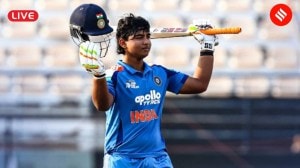National interest
At its annual day function the other day, students of a Delhi school presented a play, a kind of dream sequence where they fly around the ...

At its annual day function the other day, students of a Delhi school presented a play, a kind of dream sequence where they fly around the globe, halting at several major cities. When they return to New Delhi, and the dream is about to break, sighs one of them: quot;From the skies India looks so nice and pretty; but the newspapers are still full of the boring rubbish on the CTBT.quot;
So why am I daring to write one more column on this four-letter enigma that is turning out to be one of the bores of the millennium?
It is because India has to choose in the next couple of months between signing up and bargaining for a quot;good guyquot; dividend and thumbing our noses at the world in sheer defiance. Before I plug my choice, let me try to simplify, demystify and dejargonise the issue a bit. This debate must proliferate beyond a small charmed circle which knows everything already and where each member has made up his mind one way or the other. It is dangerous to leave such a serious security issue only to strategicanalysts.
Broadly, there are two approaches to the CTBT. One is based on India8217;s supreme national interest and security considerations. The other is ideological, rooted in the Cold War, pro-West/anti-West paradigm. Here is the first one: If we, particularly our scientists, are convinced that they have enough data, expertise and skills to conduct sub-critical tests and maintain our deterrence for the next 25 years or so, let8217;s go ahead, wangle a decent sign-up bonus, and be done with it. But if they still have doubts, or anticipate situations that require us to test bigger, newer nukes, just say no. Nothing, no cheap loans, no pain of sanctions, would make it worthwhile for us to join the treaty and compromise our children8217;s security.
The second approach is simpler: Should we sign the CTBT to please the Americans and the G-8 countries? Or should we say no in sheer, cussed defiance just to spite them?
Presumably most Indians barring the cold warriors with their minds frozen in the Sixties who wish tofight the Cold War again because they now have the bomb would prefer the first approach: sign the treaty if it does not compromise your future security; but if it does, defy the world even if the punishment is isolation.
The key to future strategy-making is figuring out your likely enemies. Pakistan, we need to worry about. China? Possible, but not particularly likely. We tend to stick to our holy national position of China being the nuclear enemy number one to justify our weaponisation. But let us also not get carried away by our own rhetoric. At this point China has left us so far behind economically and militarily that we flatter ourselves by imagining it is stockpiling a nuclear arsenal aimed at our metros. Particularly as in this region, the nukes will continue to be the last resort of the side on the verge of losing a conventional war. So the question we need to answer is: are we likely to have enough, in 2025, to deter the Chinese from making a conventional attack across the Himalayas, withouthaving to test again? Our nuclear scientists over the past six months have repeatedly said yes to that.
With Pakistan, it is a different equation because it could resort to nuclear blackmail, a kind of deterrent first strike even before a conventional war gets underway. For that, you need a strong, fail-safe second-strike capability that could write off not one city, but all of Pakistan. Ask the scientists if they think India would, in foreseeable future, need to test again to be sure of that capability. The answer will be a firm no.
We tie ourselves into knots asking the wrong question all the ti-me: Should we sign the CTBT or not? The mo-re apt question is: Could it jeopardise our future security if we gave up the option of conducting more tests? If the scientists think that we won8217;t and the bulk of the strategic community agrees, the equation is simplified: 15 years from now, are we likely to be a more secure and stable nation if we join the global economic and political mainstream as a nuclear quot;havequot;or if we prefer defiance, isolation and prolonged sanctions to keep the option of further testing open?We are blighted by an old, the-world-is-out-to-get-us paranoia, so we can8217;t look at ourselves as a big power, even as a member of the nuclear club. We demean and diminish ourselves by fearing the West would reduce us to an Iraq or a North Korea. Call it self-flagellation, inferiority complex or collective masochism but these are traits we have inherited from Cold War years. We forget that Iraq got devastated for invading Kuwait in 1990. We merrily dismembered Pakistan, a treaty-bound US ally in 1971. We are also the only nation in post-World War II history to have successfully annexed a quasi-sovereign state, Sikkim.
The world acknowledges we are no Iraq or North Korea. Are we uncomfortable accepting that, because a big power status brings responsibility? The fact that the sanctions haven8217;t hurt us as badly as feared, that rich countries have been looking for excuses to dilute them, underline two things.One, we are treated differently from Iraq or North Korea. Second, there is a hope, even presumption, that we will be a responsible nuclear power, not a blackmailing rogue.
It is evident the Vajpayee Government is taking the final steps towards signing the CTBT. Can India do it as a confident, mature and responsible nuclear quot;havequot;? Or will it look as if being dragged kicking and screaming to sign it? How ridiculous that we test a panoply of nuclear weapons, including fusion and thermonuclear devices, and yet carry on with the nuclear have-not complex. Hypocrisy may be our national trait but we can8217;t demand membership of the nuclear club and yet keep cursing it for victimising the others.
Around the world, power is now defined in newer, complex terms. Military deterrence is essential, but you also need per capita income, balance of trade, quality of governance and infrastructure and human capital 8212; in short economic strength and political stability. We have to now decide what is more likely to take us tobig power status in the next decade 8212; joining the global mainstream as an acknowledged nuclear weapons power, or crouching in a corner, if not isolation, as a perennial global whiner and spoiler.
This column will now appear every Saturday.
- 01
- 02
- 03
- 04
- 05































